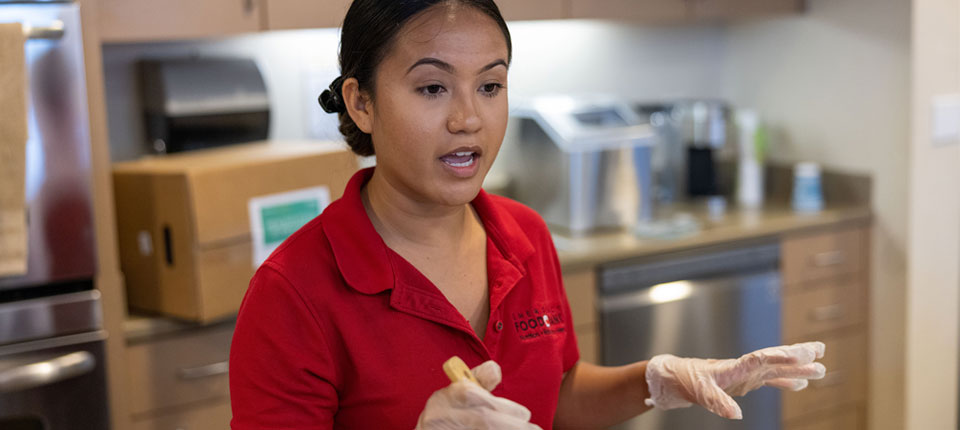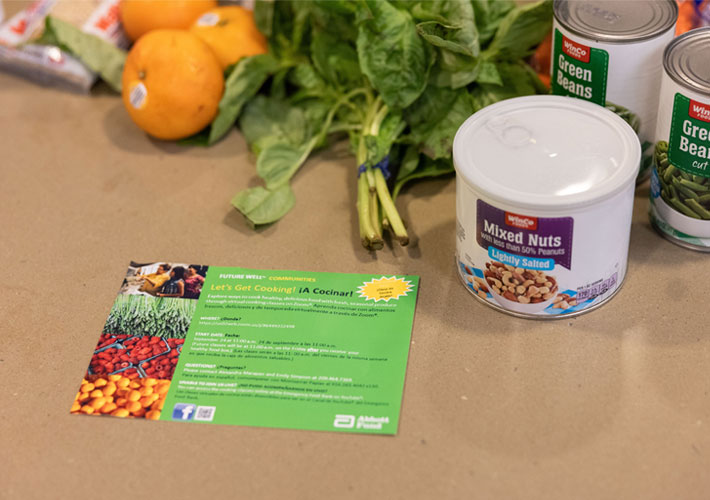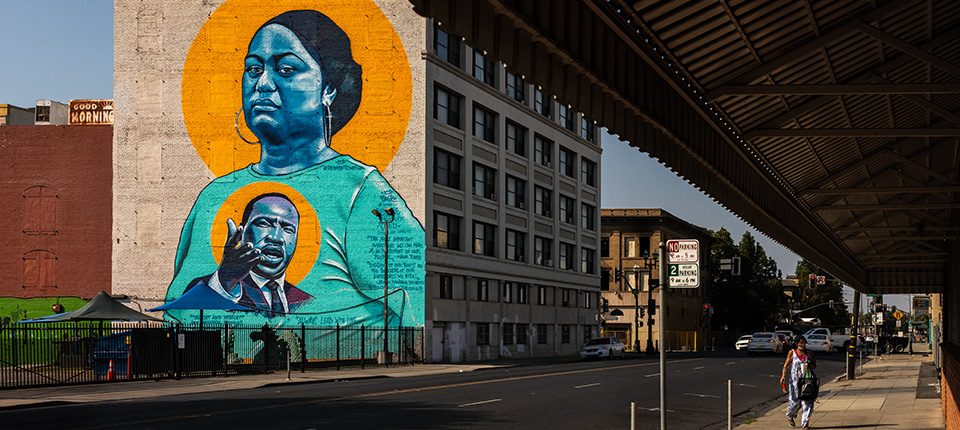
Can a ‘food as medicine’ approach help manage diabetes?
In Stockton, Calif., delivering healthy meal boxes to people with diabetes has led to encouraging results.
Nov. 08, 2023
- Copy Link
- Share on X
- Share on Facebook
- Share on Linkedin
“Olive oil is my favorite oil,” nutrition educator Alex Marapao says, her words wafting out along with the smell of herbs and greens sizzling in a pan.
“I don’t know if you cook with olive oil at all, but, if you don’t, I recommend it the next time you go grocery shopping,” she continues. “I always use olive oil when I cook, and I think it gives a good flavor.”
An ode to oil. Only, it’s much more than that.
Marapao sprinkles tributes like that into every cooking demonstration she gives at the Emergency Food Bank of Stockton, Calif. She shouts out lean proteins, leafy greens (like the ones she was sauteing in the olive oil for an omelette), whole grains — anything you would label “good for you.”
And that is intentional, because, in the battle against diabetes, food is medicine.
The educators at the Food Bank — including Marapao, the nutrition programs supervisor there — are on a mission, along with Community Medical Centers of Stockton and several other dedicated organizations. They want to share nutrition education that takes root in the community and grows healthy habits. And they want these habits to last not only a lifetime, but for generations to come.
It’s a critical mission in Stockton — a city of about 320,000 people just south of California’s capital city of Sacramento — where almost 60% of residents are prediabetic or living with diabetes.1 It is also a city where, like many around the United States, there are neighborhoods that are considered “food deserts” because they don’t have access to neighborhood grocery stores, making it a huge challenge to access healthy, affordable food.
That’s why we partnered with these organizations to design a program called Healthy Food Rx that launched in 2021 and receives funding from the Abbott Fund, the philanthropic arm of Abbott.
Participants in the program get a box delivered to their homes every other week. Each is packed with a rotating roster of proteins, produce and other healthy staples. (Some of the items in a recent shipment: kale, mango, pineapple and peanut butter.)
What happened when we worked with our community partners to try to grow the “Food as Medicine” movement in Stockton in an organic way?
The early results are encouraging.

Good Things from Good Food
Food as medicine? Meaning, take two heads of lettuce and call your doctor in the morning?
Well, no. But …
That statement isn’t as silly as it sounds. “Food as Medicine” essentially boils down to the idea that you can draw a straight line from healthy foods to improved health. That’s why, when you hear “Food as Medicine,” you also hear about things like medically tailored meals and produce prescription programs.
Our Healthy Food Rx program puts a grassroots twist on that “prescription” model. After all, the other major aim of the movement is to make sure everyone has access to good nutrition. Instead of having a doctor write prescriptions or putting out medical recommendations, we tackled the problem of food insecurity head-on by delivering the food directly to people managing chronic illnesses.
Already, Stockton is seeing results.
We conducted a study with the Public Health Institute of the “first batch” of 450 participants in our program over the course of 12 months. And what we found was that many of them were able to lower the glucose level in their blood. Participants with uncontrolled diabetes saw their A1C levels go down by 0.8%, and the A1C level of the entire cohort decreased by an average of 0.35%. Both decreases marked statistically significant changes.
On top of that, we saw evidence that healthy habits were taking hold, and that the gospel of good nutrition was spreading. Fruit, vegetable and water consumption went up. About three-quarters of the people in the study said they were still following their meal plan after a year. And almost 40% of them said they now talk to mentors and friends about healthy living.
Ready for a Change
“The light bulb went on for me when I started losing weight without trying,” says Barbara White.
White lives in Stockton and makes a mean soup. She loads it up with seafood, macaroni — and, lately, kale, cabbage or greens.
“My grandson … one time, I had broccoli but I forgot to put it in the soup. He called me on it,” White says with a laugh. “And he was 5 years old.”
White was an enthusiastic member of the first cohort of our Healthy Food Rx program. Before joining, she had been contending with a post-pandemic double whammy: her diabetes, for one thing, and being able to find the healthy foods she needed to manage it.
“I’m going to four different stores,” she says. “You try to route it so that you hit everybody — and you get what you need and get out of there. Because, if not, you end up going over budget.”
Which segues into another highlight from our Healthy Food Rx 12-month data: Food security increased to 44% from 34%.

All Together Now
Nutrition is an important part of the solution the world needs to counteract the global diabetes epidemic, which impacts hundreds of millions of lives.
But it’s one part of many. Our dose of “Food as Medicine” fits into a larger strategy that people in Stockton started building with us five years ago — an initiative we called Future Well Communities. While Healthy Food Rx delivers eats and education:
- Community Medical Centers provides patients with health education and peer support paired with medical visits to help them stay on track.
- Community organizations APSARA and El Concilio connect people with diabetes to local community health workers, healthcare services and transportation to get them there.
- And the Stockton-based University of the Pacific runs diabetes clinics that provide free health screenings and referrals for treatment and other services they need.
The closer these partners work together, the tighter the bonds they form — and the more insights they find. One example: Students from the University of the Pacific’s School of Pharmacy recently presented research based on more than 800 screenings at 10 different community health fairs. What was the service they referred the most people for? Nutrition education, which the Emergency Food Bank can now provide, thanks to grants from the Abbott Fund and other organizations.
Marapao and others at the Emergency Food Bank bake an educational element into every Healthy Food Rx box delivery. When Marapao talks up the flavor of olive oil, she’s really speaking to the underlying benefit of cooking with a healthy fat instead of canola or vegetable oil. The staff whips up tasty recipes and brings them to life in those live cooking demonstrations from the Food Bank’s test kitchen.
People get the food, most importantly, but they also get to cook along at home and bond with each other over their favorite nuggets of nutrition knowledge.
Given all of this — and the encouraging results we’ve seen early on from Healthy Food Rx — we’re expanding the next group of participants in the program to 1,000.
As Leonard Hansen, CEO of the Emergency Food Bank, says: “The idea is to inject at least some ‘food-as-medicine’ thinking into all of what we do. And we do that through the community health workers.”
Each food box is delivered with hope — that, with programs like Healthy Food Rx, with partnerships like Future Well Communities, we’re cooking up a fresh approach to helping people live healthier lives.
References
1 Kietzman KG, Bacong AM, Gutierrez B, Pourat N. Addressing Social Determinants of Health in Stockton: Abbott Fund’s Strategic Plan. UCLA Center for Health Policy Research; 2018.
Healthy Food Rx Recipe
Pressed Kale Salad with Tofu and Pineapple
Ingredients:
Salad
- 3 cups kale
- 2 cups dandelion
- 1-½ cup diced pineapple
- 2 cups grilled tofu
- Pecans and blueberries (optional)
Dressing
- ½ cup olive oil
- ¼ cup balsamic vinegar
- 1 teaspoon honey
- 1 teaspoon Dijon mustard
- 1 shallot, minced
- 1 clove garlic, minced
- salt and ground black pepper to taste
Directions:
- In a mason jar combine olive oil, balsamic vinegar, honey, Dijon mustard, shallots, garlic, salt and black pepper.
- Place the lid on the jar and shake vigorously until thoroughly combined.
- In a big bowl combine kale, dandelion, pineapple and grilled tofu. (Optional: top with pecans and blueberries.) Add dressing and mix up until vegetables are fully coated.
- Serve and enjoy!
Related articles
-
Sustainability
Addressing Social Issues to Advance Health Equity
Future Well Communities tackles complex social barriers that complicate diabetes and prevent people from living healthy.
For the latest on Abbott’s life-changing technology, get updates directly in your inbox.
